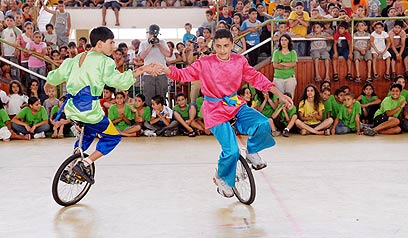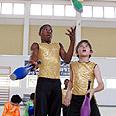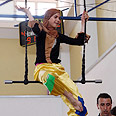The groups’ premiere was supposed to take place in a Dir al-Assad school where Maryam Assadi, who was killed with her son by a Katyusha during the Second Lebanon War, was a teacher. But the premiere was canceled because of the weekend events, and the young circus performers went to nearby Majdal Krum. Thousands of children and campers cheered on Sunday as dozens of circus performers – the youngest only four years old – juggled balls, sticks, and swords, performed amazing acrobatic feats, rode unicycles, and swung on the trapeze. Even after the performance had ended, encore followed encore as the audience whistled and clapped enthusiastically.

'To break down barriers and to get to know each other.' The circus in a performance. (Photo: Doron Golan)
Some 50 children and young people are members of the Galilee Circus, half of them residents of Karmiel and towns in the Misgav region, and half of them from the Arab towns of Ba’ana, Dir al-Assad, and Majdal Krum.
“A meeting between Jewish and Arab youth in this kind of framework has several advantages,” explains Rabbi Marc Rosenstein, director of the Galilee Foundation for Ethical Education – Shorashim, which runs the circus.
“First of all, you don’t need a language, and it doesn’t matter if they speak Arabic or Hebrew. Second of all, they need to trust each other. When one young person jumps the second one must catch him, and they have to trust each other completely. The third and most important advantage, which affects all areas of life, is the need to overcome fear. This isn’t something natural something you can take for granted when you’re talking about circus exercises, and certainly not when you’re talking about the fear of other people.”
The fear Rosenstein describes was also a part of the preparations for the encounter between the Israeli and American circuses. “The director of the circus from St Louis asked me if it wasn’t dangerous to come to Israel,” he notes. “But last week, when we had a campfire on the shores of the Jordan river and her charges jumped and rolled over the fires, I once again discovered that fear depends only on your perspective.”
What’s next? This week the young circus performers appeared at a club for the disabled in Kiryat Haim, and later they’ll perform in Jerusalem, where they will also meet with members of a Jerusalem Jewish-Arab youth circus. Along the way they will practice not only their awe-inspiring juggling, but also coexistence among the participants.
“For all Jewish, Christian, and Muslim holidays the children bring holiday foods to their weekly training session and give explanations,” says Ahmad Sanala, father of Tamer, one of the members of the group. “This is the most correct way to break down barriers and to get to know each other.”

















